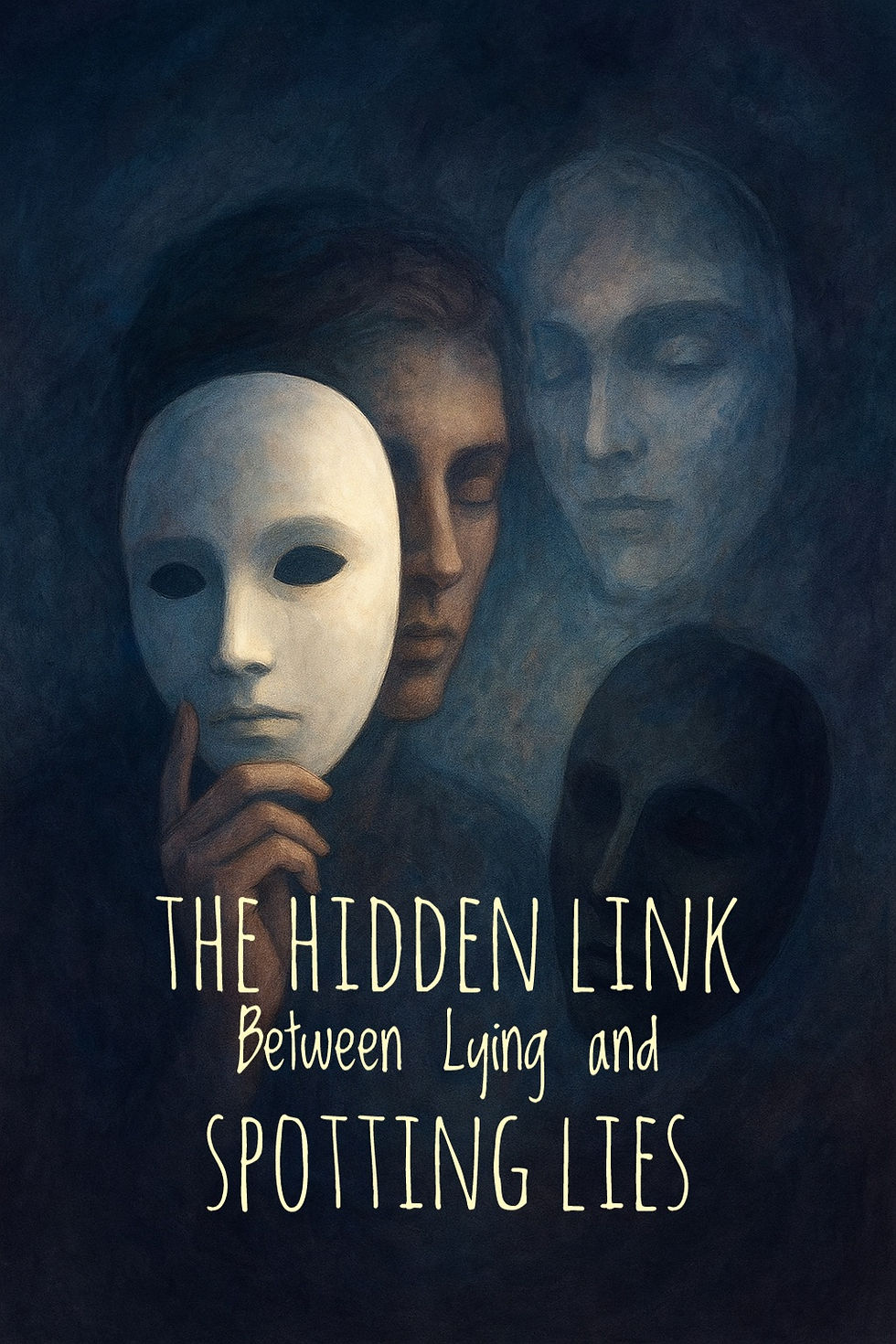Do good liars make good lie detectors? The psychology behind deception
- Anupriya Therapysupport
- Sep 6, 2025
- 4 min read

A few years ago, a client told me a story about his colleague, Raj. Raj was the kind of person who could bluff his way through office politics with ease. He always had an explanation ready, and most of the time, people believed him. One day, during a casual team conversation, someone told a half-truth about a project delay. Raj immediately leaned in and whispered to my client, “He’s lying. I can tell.”
It left my client wondering…are good liars also good lie detectors?
This question isn’t just about office gossip. It touches something deeper in human psychology: our ability to spot deception in others, and whether the very skill of lying sharpens that ability.
The argument for “Yes”
Psychologists have long debated whether people who are skilled at deception are also skilled at detecting it. One school of thought suggests that lying requires a kind of mental gymnastic:
You need to imagine what the other person believes.
You must suppress the truth.
You need to build a convincing story.
This process, what researchers call ‘Theory of Mind’ is the ability to understand what someone else is thinking or feeling. Skilled liars often have a highly developed Theory of Mind because they constantly step into another person’s shoes to make their lies believable.
Case example: Children who are adept at fibbing in experimental studies (like hiding the truth in a guessing game) also tend to do well in tasks that measure perspective-taking. This suggests that lying and lie detection may share the same mental “muscle.”
Everyday examples show this in action:
A child knocks over a vase and quickly says, “The cat did it.” They know their parent didn’t see the accident and that the cat is a believable culprit.
A teenager planning a surprise party tells their mom, “I’m just meeting a friend for coffee,” carefully choosing a story that sounds normal and harmless.
At work, an employee who hasn’t finished a report tells the boss, “I’m just putting the finishing touches on it,” predicting that this explanation will sound efficient and reassuring.
In each case, the fib works because the liar steps into the listener’s mind and imagines what will make sense from their point of view.
If liars practice this mental perspective-taking often, they may also get better at noticing when someone else is bending the truth.
The Counter-Argument
But here’s the catch: research also shows that humans, in general, are pretty bad at detecting lies. Most of us hover around 50–55% accuracy, barely better than chance. Even professionals like judges, police officers, or therapists don’t do dramatically better unless they have specialized training.
And when it comes to “good liars,” the evidence is mixed:
Some liars are better lie detectors because they recognize the subtle tricks they themselves use.
Others are worse, because they assume everyone lies the way they do and misread cues.
Think back to Raj: if his own fibbing style involved leaving out details, he might spot when someone else did the same. But if another person used charm or flattery instead, Raj might miss it completely.
The psychological middle ground
A balanced view is that good liars may have an edge in detecting lies, but only under certain conditions:
1. Self-awareness – They know the exact strategies they themselves use.
2. Empathy and attention – They’re tuned in to what others are saying and how they’re saying it.
So it’s not lying itself that sharpens lie detection. It’s the deeper skills underneath, perspective-taking, empathy, and observation, that matter.
A real-life parallel
Think about siblings growing up together. One child learns how to sneak an extra cookie without getting caught. Over time, they also learn to spot when their brother or sister is being sneaky, like noticing crumbs on their shirt or the way they avoid eye contact.
Their ability to catch the fib doesn’t come just from lying themselves, but from paying close attention to the little signs that go with it. In the same way, people who lie often may sometimes spot lies more easily, but only if they’ve trained themselves to notice the patterns in others’ behavior.
Takeaway
So, are good liars always good lie detectors? Not really. Some are, some aren’t. The real lesson here is:
Detecting lies is less about being a liar and more about having empathy, perspective-taking, and careful observation.
Anyone can improve their ability to read truth from lies by strengthening these underlying skills.
At the end of the day, honesty creates stronger, safer relationships than deception ever can. But knowing how lying and perspective-taking work gives us a sharper lens to understand human behavior.
Science box: What research says
Children and fibbing: In the classic “peeking game,” children are asked not to peek at a toy when an adult leaves the room. Many peek, and when asked, some lie. Studies show that children who tell consistent lies also score higher on Theory of Mind tasks, meaning they’re better at imagining what others know and don’t know (Talwar & Lee, 2008; Ding et al., 2015).
Adults and lie detection: Research finds that people with stronger cognitive Theory of Mind (the ability to track others’ beliefs) and emotional awareness are slightly better at detecting deception, though even they don’t reach perfect accuracy (Vrij, 2008; Masip et al., 2019).




Comments